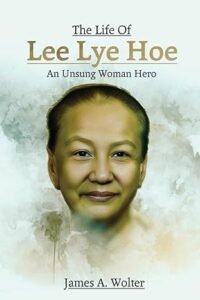Review | THE LIFE OF LEE LYE HOE by James A. Wolter (Malaysia)
A new book —

The Life Of Lee Lye Hoe: An Unsung Woman Hero
Amazon Direct Publishing
by James A. Wolter (Malaysia 1962-66)
June 2024
353 pages
$16.79 (Paperback)
Reviewed by: Douglas C. MacLeod, Jr.

James A. Wolter (Malaysia 1962-66)
The Life of Lee Lye Hoe: An Unsung Woman Hero, written by James A. Wolter, is a fictionalized autobiography from the standpoint of a Cantonese woman whose life takes a drastic turn from being an esteemed, successful landowner to a lowly Amah (servant and nanny) in the short timespan when Communism was becoming the predominant ideology in China. She is onery, stubborn, savvy, hard-working; in many ways, Lee is forced to be obdurate, because during her formative years, her father stole the family’s savings and ran off to another country; and her mother, soon after taking in a family member’s two children (Yang and Meow), withered away and died, leaving the farm and the two youngsters in Lee’s care.
Throughout the first part of the novel, it is established that Lee has been soured by her parents’ failed relationship, so she does not want to get married nor does she want to have children of her own. She is courted regularly by the eager neighbor’s somewhat hapless son, Soo Bing; however, Lee has no interest in getting involved with a boy who seemingly has no real prospects. During the first two decades of her life, Lee is proud to be a resourceful and independent young woman. She is thrust into learning about farming, haggling, and mothering and she flourishes in her new roles. So, why would she want to muddy the waters? Much of the first section of The Life of Lee Lye Hoe uses Lee as an illustration of how women, in what was a misogynistic time and culture, had more strength than perceived, and could survive under their own volition, even under the pressure from forceful and lecherous men. It is in these first chapters where Wolter is most effective. He superbly provides Lee with a hearty voice that establishes how robust and strong-willed a character she is and will be, even after she gives up the farm, escapes from Canton to ensure her and her family’s safety, and becomes a humbled domestic in a bourgeois household in Penang.
The second part of the book is equally as effective as it pertains to character development. Lee becomes a pseudo-parent to her bosses’ daughter, Moke Chee, and the love and care that she feels for the child is written with honesty and realism. Wolter, in a sense, gets into the mind and heart of Lee, who is continuously lambasted by the Mistress of the house and ignored as an important part of the family by the Boss, whom Lee saves from certain death after he gets incarcerated and let go by the Japanese during World War II. She is quietly resilient during these moments, taking the brunt of the Mistress’s accusations and vitriol, while also accepting the Boss’s indifference during times when action is warranted and necessary. Lee is a good and helpful soul, who attained a hard shell early on in life, but reluctantly allowed that shell to soften as the years went by, in order to safeguard the girl she affectionately calls her daughter. Ultimately, these traits make Lee endearing and a well-rounded protagonist from the beginning of the story to the end.
The Life of Lee Lye Hoe ultimately is a fine historical novel and fictional memoir that illustrates the power, strength, and tenacity of independent women from the past and the present, throughout the world.
No comments yet.
Add your comment